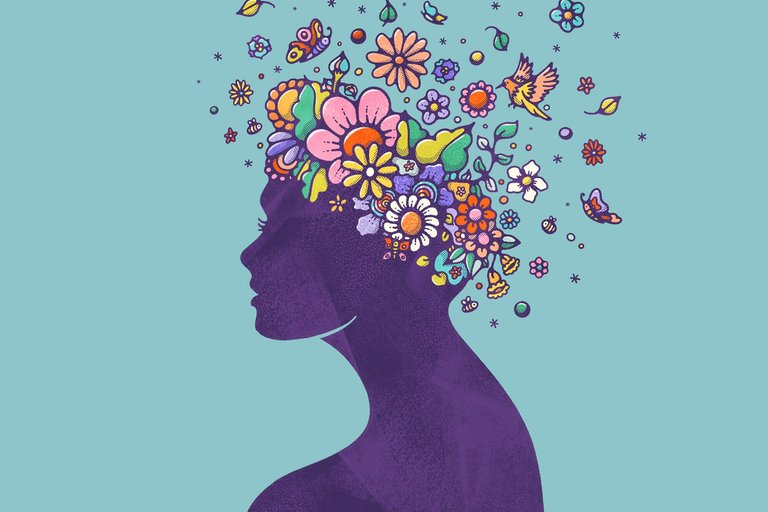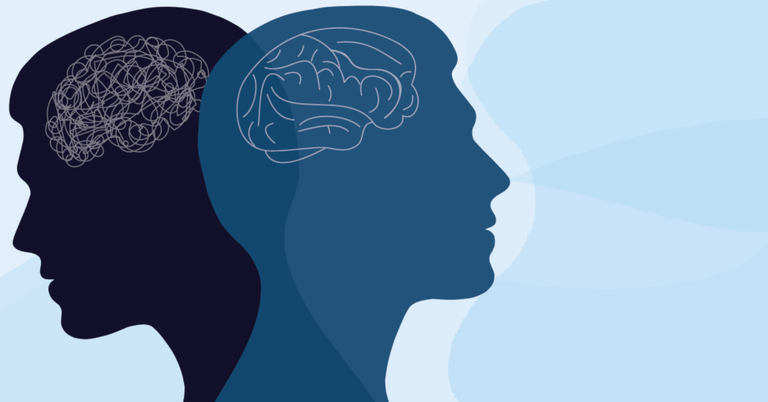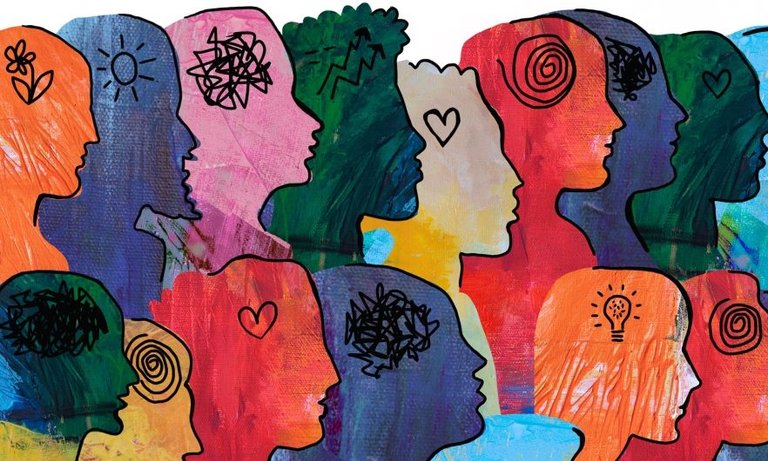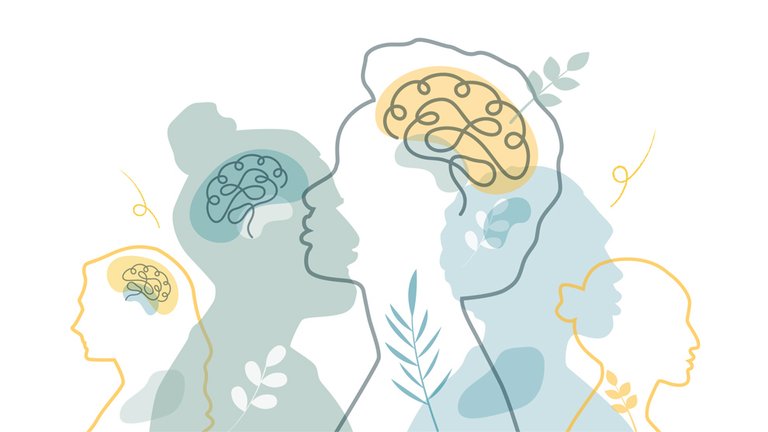Keep scrolling for the English version
¡Hola, Hive!✨
Todos los 10 de octubre se celebra el día mundial de la salud mental, un día que tengo bastante presente pues celebra y concientiza sobre lo que estudio desde hace años. Actualmente hay muchísima información al respecto cada vez más difundida, incluso así todavía existe cierto prejuicio entorno al tema. Por ello, a pesar de que no suelo darle mayor importancia a los días festivos, decidí compartir un poco de mis reflexiones sobre el tema, porque aún es importante hacer llegar esta información a cuantas personas sea posible.


Resulta sumamente importante comprender que la salud no es solamente lo físico. Sí, es importante tener bienestar, comer una dieta balanceada, hacer ejercicio, tener un horario del sueño adecuado, entre otros. Eso es ser saludable. Pero también lo es atender tus emociones, tus pensamientos, tus conductas y cómo cualquier circunstancia de tu vida puede estar afectándote, dado que la salud es un equilibrio entre el estado físico, mental y emocional, por lo que todo debe recibir el mismo nivel de atención e importancia.
Se solía pensar en la mente y el cuerpo como una dualidad, dos aspectos del ser separados, pero lo cierto es que su conexión es estrecha; si uno no está bien, el otro tampoco lo estará. Piénsalo un poco. Cuando estás profundamente triste, ¿cómo se siente a nivel corporal? ¿Tienes la misma energía? ¿La misma fuerza? Y cuando estás bastante enfermo, ¿te sientes feliz y tranquilo? ¿Animado?... Quizá las respuestas te parezcan de sentido común, pero muchas personas no notan esa conexión. Se enfocan en lo físico pero dejan de lado lo mental, o viceversa.

Hay un estigma muy arraigado respecto a las enfermedades mentales, como si fueran algo sumamente contagioso o como si una persona valiera menos por tener algún trastorno. Tener una condición a nivel mental no es más que algo que se debe tratar, algo que se puede mejorar con la ayuda profesional necesaria y los métodos adecuados. Así como es completamente normal asistir a un médico por presentar algún malestar físico, debería ser igualmente normalizado el asistir al psicólogo o psiquiatra por un malestar mental o emocional. Más aún sabiendo que las afecciones mentales son extremadamente usuales en la población que cada vez más se enfrenta a condiciones adversas que derivan en esas consecuencias.
Nadie nunca debería sentir vergüenza en decir que asiste a un psicólogo o que presenta determinado trastorno. Todos de alguna manera necesitamos la guía para analizar nuestro estado emocional, cognitivo y conductual porque no siempre se está bien en estas áreas.

Si te preguntas quién puede sufrir de alguna afección mental, pues la respuesta es cualquiera. En mayor o menor medida todos podemos vernos afectados por algo que altere el equilibrio de nuestro funcionamiento cognitivo, emocional o del comportamiento puesto que la estabilidad o salud mental puede decaer, literalmente, en cualquier momento. Un día puedes estar perfectamente bien, y al siguiente puede ocurrir algún evento que te haga perder el equilibrio, dejándote profundamente afectado. Puede que a muchos les haya pasado o puede que les pase en el futuro, es por esto que contar con las herramientas psicológicas necesarias es de vital importancia, para poder aprender a sobrellevar las distintas situaciones de la vida de una mejor manera.

Se tiende a pensar que si vamos a un psicólogo es por algo ya muy grave y al contrario, no necesariamente debes acudir cuando sea algo muy profundo o difícil de sobrellevar; puedes asistir cuando simplemente necesites una guía, herramientas o cualquier cosa que te ayude a adquirir hábitos o modificar pensamientos para vivir mejor.
Si más personas tomaran la iniciativa de escucharse mejor, de identificar cómo se sienten y buscar ayuda, muchos estarían en mejores condiciones para afrontar los distintos retos de la vida diaria. Porque si bien pueden mejorar, siempre van a enfrentarse a adversidades que pueden afectarles nuevamente.
Sin embargo, hay que destacar un aspecto clave que es que el psicólogo no solucionará tus problemas con una varita mágica para hacerlos desaparecer, tampoco sabe leer tu mente para saber lo que deseas alcanzar ni nada similar. Es una persona dispuesta a acompañarte en tu proceso para guiarte y potenciar habilidades que tú ya posees. Así serías tú quien tome la iniciativa de cambiar, eres tú que mediante esfuerzo y bastante trabajo lograrás modificar la manera en que tú actúas frente a las circunstancias. Tú debes estar dispuesto a mejorar, si no, no importa a cuántos psicólogos vayas, no habrá resultados.

Es por ello que te invito a informarte, a leer e investigar más sobre el tema para que te permita comprender un poco mejor la manera en que funcionamos todos los seres humanos. Esto te permitirá comprenderte mejor a ti mismo y priorizar tu propio bienestar, así como promoviendo el del resto de personas a tu alrededor. Porque recuerda...




English
Hey there, Hive!✨
Every October 10th, World Mental Health Day is celebrated, a day that I keep in mind because it celebrates and raises awareness about what I have been studying for years. Currently, there is a lot of information about it that is becoming more and more widespread, but there is still some prejudice surrounding the subject. Therefore, even though I do not usually give much importance to festivities, I decided to share some of my thoughts on the topic, because it is still important to get this information to reach as many people as possible.


It is extremely important to understand that health is not just about the physical aspect. Yes, it is important to be well, eat a balanced diet, exercise, have an adequate sleep schedule, among others. That is being healthy indeed. But it is also important to pay attention to your emotions, your thoughts, your behaviors and how any circumstance in your life can be affecting you, since health is a balance between the physical, mental and emotional state, so everything must receive the same level of attention and importance.
It used to be thought of the mind and body as a duality, two separate aspects of being, but the truth is that their connection is very close; if one is not well, the other will not be either. Think about it for a moment. When you are deeply sad, how does it feel on a physical level? Do you have the same energy? The same strength? And when you are quite sick, do you feel happy and calm? Upbeat?... Maybe the answers seem like common sense to you, but many people do not notice that connection. They focus on the physical but leave aside the mental, or vice versa.

There is a deep-rooted stigma regarding mental illnesses, as if they were something extremely contagious or as if a person were worth less for having a disorder. Having a mental condition is nothing more than something that must be treated, something that can be improved with the necessary professional help and the appropriate methods. Just as it is completely normal to go to a doctor for physical discomfort, it should also be normal to go to a psychologist or psychiatrist for mental or emotional discomfort. Even more so knowing that mental conditions are extremely common in the population that nowadays is increasingly facing adverse conditions that lead to these consequences.
No one should ever feel ashamed to say that they go to a psychologist or that they have a certain disorder. We all need guidance in some way to analyze our emotional, cognitive and behavioral state because we are not always well in these areas.

If you're wondering who can suffer from a mental illness, the answer is anyone. To a greater or lesser extent, we can all be affected by something that alters the balance of our cognitive, emotional or behavioral functioning, since mental stability or health can decline, literally, at any time. One day you can be perfectly fine, and the next an event can occur that makes you lose your balance, leaving you deeply affected. It may have happened to many or it may happen to them in the future, which is why having the necessary psychological tools is of vital importance in order to learn to cope with the different situations in life in a better way.

There is a tendency to think that if we go to a psychologist it is for something very serious and on the contrary, you do not necessarily have to go when it is something very deep or difficult to cope with; you can go when you simply need guidance, tools or anything that helps you acquire habits or modify thoughts to live better.
If more people took the initiative to listen to themselves better, to identify how they feel and seek help, many would be in better conditions to face the different challenges of daily life. Because although we can improve, we will always face adversities that can affect us again.
However, it is important to highlight a key aspect that is that the psychologist will not solve your problems with a magic wand to make them disappear, nor can he read your mind to know what you want to achieve or anything similar. He is a person willing to accompany you in your process to guide you and enhance skills that you already have. So you would be the one who takes the initiative to change, you are the one who, through effort and hard work, will manage to modify the way you act in the face of circumstances. You must be willing to improve, otherwise, no matter how many psychologists you go to, there will be no results.

That is why I invite you to inform yourself, read and research more on the subject so that you can understand a little better the way in which all human beings function. This will allow you to understand yourself better and prioritize your own well-being, as well as promoting that to the rest of the people around you. Because remember...



Posted Using InLeo Alpha